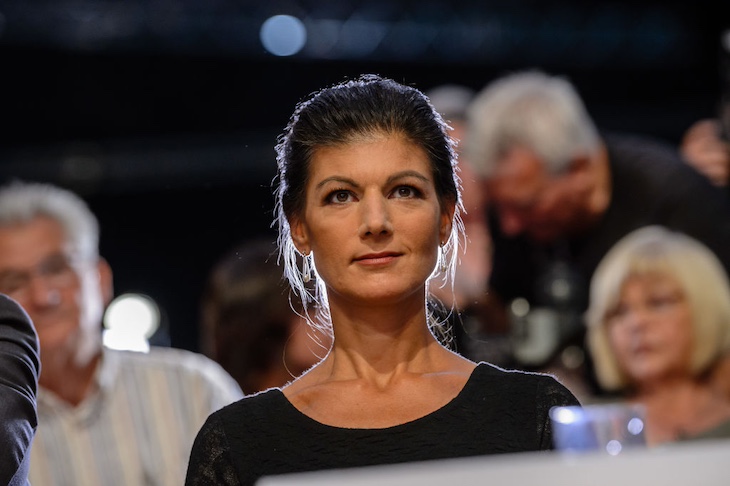It is almost six years to the day since the charismatic German left-wing politician Sahra Wagenknecht launched a new movement to counter the rise of the far-right in her country.
Wagenknecht is proof that much of the mainstream media go easy on a politician if they are perceived to be left-wing
What distinguished ‘Aufstehen’ (Stand Up) from the rest of the left was its negative view of mass immigration. Wagenknecht’s movement was greeted more with curiosity than animosity by the left-wing European press. Under the headline, ‘The emergence of an anti-migrant left in Germany’, the French paper, Le Monde, said it might herald ‘the start of a promising adventure, which could profoundly shake up the country’s political life’.
The Guardian described Aufstehen as ‘a voice for dissatisfied voters that would take a tougher approach to migration’. Wagenknecht remained an MP in the left-wing Die Linke but her anti-immigrant stance created a rift that deepened following Russia’s invasion of Ukraine in 2022. Wagenknecht makes no secret of her preference for Putin over Zelensky.
Wagenknecht resigned from the party last autumn, jumping before she was pushed. In January this year she turned Aufstehen into a fully-fledged political party, calling it the Sahra Wagenknecht Alliance (BSW).
In a two-hour press conference to mark the occasion, Wagenknecht explained that she objected to be called a ‘leftist’ because the progressive left had given their political creed a bad name this century by focusing almost solely on ‘gender and lifestyle’.
The BSW – which included 40 former members of Die Linke – would go back to left-wing basics. Its economic policies include higher wages, more benefits and a reform of the tax system. Wagenknecht reiterated her opposition to immigration, Net Zero, Nato and the continuation of the war in Ukraine.
The BSW took a creditable 6.2 per cent of the vote in June’s European elections but it is next month’s state elections in Brandenburg, Saxony and Thuringia where Sahra Wagenknecht hopes to score big.
Recent polling indicates her party will receive around 15 per cent of the vote in these states, which would establish the BSW as the pre-eminent left-wing party in Germany and the third most popular party behind the centre-right CDU and the far-right AfD.
Wagenknecht maintains she is not a ‘leftist’, just as Marine Le Pen of the National Rally says she is not ‘far-right’. When the Frenchwoman made that claim in an interview last month with CNN, she was met with incredulity. ‘You’re kidding me?’ retorted her interviewer, Christiane Amanpour.
Le Pen is labelled far-right, or at other times a ‘fascist’ because of her views on mass immigration and Islamism. But these views mirror those of Wagenknecht.
After a policeman was murdered by an Islamist in Mannheim in May this year, Wagenknecht posted a message on her website, declaring that the atrocity was ‘a perfect example of what is going wrong in asylum and migration policy and in dealing with Islamists in this country. Politicians must finally act instead of just talking. We need asylum procedures at the external borders instead of uncontrolled immigration and zero tolerance towards Islamist hate preachers.’
Despite such rhetoric, whenever Wagenknecht is profiled by the foreign media, be it the BBC or Politico, she is described as a ‘cultural conservative.’
Wagenknecht is proof that much of the mainstream media go easy on a politician if they are perceived to be left-wing.
Shortly before the European elections, the German magazine Der Spiegel described the Sahra Wagenknecht Alliance as ‘politically close to the National Rally’. They are so close as to be almost identical, economically, socially and culturally.
They also have in common a strong communist heritage. Wagenknecht harbours an affection for the East Germany she grew up in the 1970s and 80s, while it was during these decades that huge numbers of French communist voters defected to Jean-Marie Le Pen’s National Front. They did so because he was the only politician to speak out against deindustrialisation and mass immigration.
Earlier this year Marine Le Pen severed ties with the AfD when the far-right party made controversial remarks about the Nazis. She reportedly regards Sahra Wagenknecht as an alternative European ally, not least because economically they are identical to the National Rally, unlike the AfD and their belief in the free market.
When the idea of an alliance with Le Pen was put to one of Wagenknecht’s senior figures, Fabio De Masi, he retorted: ‘Of course we rule that out.’
Why should it be ruled out? Sahra Wagenknecht and Marine Le Pen agree on practically everything, from the economy to mass immigration to the madness of net zero. They also share a hostility to Nato.
Wagenknecht and Le Pen have tapped into a disillusionment and a sense of abandonment among the working-class that crosses political boundaries. They lead parties that are anti-establishment, which today means anti-progressive. The only difference between the two women is their media depiction: one is a ‘fascist’ and the other a ‘cultural conservative’.
Such labels are meaningless to their voters, who see only parties that are prepared to act on their behalf.








Comments